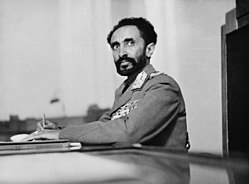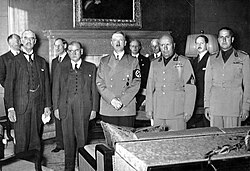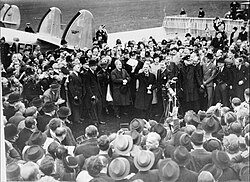Appeasement

Appeasement is a diplomatic policy of meeting political demands to a possibly-aggressive power to avoid conflict.[1]
The term was used especially for the foreign policy of the British governments of Prime Ministers Ramsay MacDonald, Stanley Baldwin and Neville Chamberlain towards Nazi Germany and Fascist Italy[2] between 1935 and 1939. It was supported by most people there and in France, most notably under Édouard Daladier, because people feared another world war.
Appeasement Media
Emperor Haile Selassie of Ethiopia, c. 1942
British Prime Minister Stanley Baldwin
Seyss-Inquart and Hitler in Vienna, March 1938
From left to right: Chamberlain, Daladier, Hitler, Mussolini and Ciano pictured before they sign the Munich Agreement, which gave the Czechoslovak border areas to Germany
British Prime Minister Neville Chamberlain, landing at Heston Aerodrome on 30 September 1938 after his meeting with Hitler at Munich. In his hand, he holds the peace agreement between Britain and Germany.
Related pages
References
- ↑ Appeasement – World War 2 on History Archived 4 April 2013 at the Wayback Machine
- ↑ Robert Mallett, "The Anglo‐Italian war trade negotiations, contraband control and the failure to appease Mussolini, 1939–40." Diplomacy and Statecraft 8.1 (1997): 137–67.




